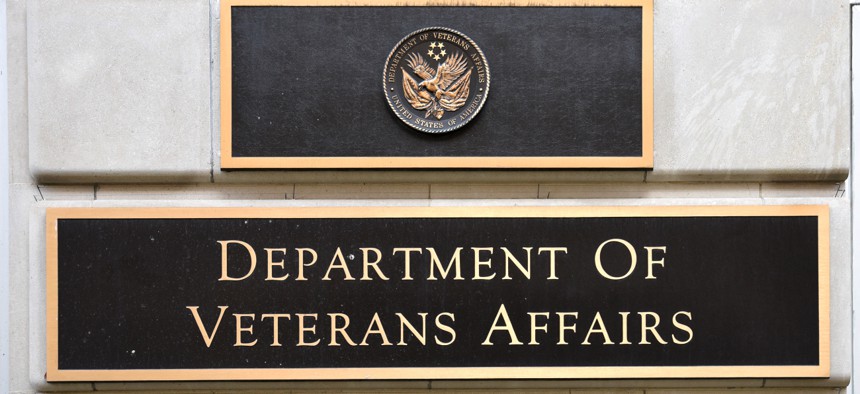
VA employees reported staffing shortages stemming from workers testing positive for COVID led to staff taking on responsibilities outside their normal duties. obert Alexander/Getty Images
VA Hopes Its Staffing Progress Will Help With the Looming COVID Wave
Officials are still looking for new tools to staff up, including by removing a $400,000 annual pay cap for some employees.
COVID-19 cases are rising across the country and within the Veterans Affairs Department, but VA officials said this time around they are much better equipped to handle a winter surge.
The department is in the midst of a targeted effort to increase its health care staff thanks to new resources Congress provided as part of the Honoring Our Promise to Address Comprehensive Toxics (PACT) Act, which President Biden signed into law earlier this year. While those hires are aimed at allowing VA to handle a new trove of veterans now eligible for care due to their service-connected exposure to burn pits, VA Undersecretary for Health Shereef Elnahal said on Tuesday it was also improving the department’s position in the face of a seasonal COVID-19 wave.
“This is, of course, all apropos of our hiring goals as well as staff fortification, especially if employees that are unable to work get to a high level as they did this last winter,” Elnahal said.
Last winter, VA employees reported staffing shortages stemming from workers testing positive led to staff taking on responsibilities outside their normal duties and stretching resources to keep all areas of their facilities open with much lower capacities. In early January last year, more than 7,500 employees had active cases, compared to slightly less than 2,000 now. Elnahal expressed confidence VA can avoid a similar fate this time around, even if cases continue to grow.
“We will employ every single tool we've done before on getting support to local facilities where they need it,” he said, noting those offices now have playbooks for dealing with COVID surges. “We hope that that's not needed anywhere, but we’re prepared just in case it is.”
VA hired 48,500 employees in fiscal 2022, an 11% increase from the previous year’s total. The Veterans Health Administration netted more than 1,800 employees in October—the first month of the new fiscal year—compared to zero last year. Elnahal set the target for total hires for the fiscal year at 52,000. The department has been hosting "surge events" in recent weeks to prepare for PACT Act implementation, which has led to more than 12,000 potential hires.
In addition to its normal Disaster Emergency Medical Personnel System program that helps deploy staff to areas with shortfalls, Elnahal said VA is standing up and staffing a new initiative that will send out employees who, unlike those in the existing program, do not normally see patients.
“We're continuously trying to think about how we fortify deployable clinical teams in the context of the pandemic, knowing that we're still in the middle of it,” he said.
VA is one of the few federal agencies that still has a vaccine mandate in place, though it has seen little disruption as a result. Just 11 employees have been fired for “failure to follow safety protocols”—which includes refusing vaccination—while 78 were otherwise disciplined. Nine in 10 VA health care workers have documented that they are vaccinated against COVID-19, while 9% requested religious or medical exemptions. Some employees have been reassigned to accommodate their unvaccinated status.
Weekly COVID-19 cases in the United States recently eclipsed 400,000 for the first time in months, following a similar pattern seen last year before the total peaked at 5.6 million in January.
Elnahal said his goal in the coming year is to standardize higher rates of hiring so facilities have to rely less on surge events, which require significant resources. He is also seeking additional help from Congress, even after it provided a slew of new workforce flexibilities as part of the PACT Act. VA is looking to raise the cap on aggregate pay for physicians, dentists and podiatrists beyond the current limit of $400,000. He lamented the department is losing too many employees and candidates to the private sector who offer far larger salaries, but said key lawmakers have been receptive to the proposal.
VA has already begun implementing the Retention and Income Security Enhancement (RAISE) Act, which President Biden signed into law in March as part of the omnibus funding package. That has led to VA approving pay increases for nearly 10,000 nurses, boosting their salaries to a new cap of $203,000 per year. Any nurse at the previous cap, or within 10% of it and working in certain markets, automatically saw a pay increase.
The department has rewarded high performers more generously after the PACT Act removed caps on bonuses and allowed for special contribution awards worth $25,000. It has increased efforts to bring on early career talent by using new expedited hiring for recent graduates and increasing student loan repayments. Elnahal reiterated that VA will, by the end of the year, implement provisions to provide critical skill incentives, special pay rates and pay waivers.
VA’s new employees will have their hands full with more than just COVID-19 cases. The department has already conducted nearly 700,000 toxic exposure screenings as it implements the PACT Act, with about 38% reporting exposures. Elnahal said VA has so far trained 111,000 employees “on all things PACT Act” to prepare them for the screening process and conditions that can result from exposure.







